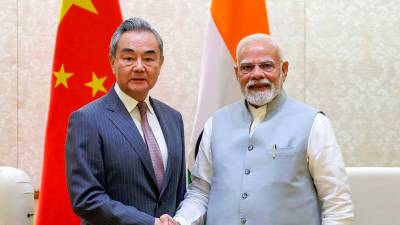BEIJING: China and India have pledged to resume direct flights between the two nations in a significant diplomatic development.
The announcement came as Chinese Foreign Minister Wang Yi concluded his official visit to New Delhi on Wednesday. This breakthrough forms part of broader efforts to normalize relations between the world’s two most populous countries.
Following Wang’s discussions with Indian officials, both countries agreed to advance negotiations on their disputed border issues.
The neighboring nations also committed to resuming tourism visa issuance and boosting bilateral trade.
According to Xinhua news agency, both sides agreed to explore advancing boundary demarcation negotiations during Wang’s meeting with Indian National Security Adviser Ajit Doval.
The diplomatic thaw represents a notable shift from the strained relations that followed the deadly 2020 border clash.
The reconciliation process began last October when Prime Minister Narendra Modi met Chinese leader Xi Jinping for the first time in five years. Modi is scheduled to travel to China later in August for his first visit since 2018, signaling further warming of ties.
Wang Yi now proceeds to Pakistan, India’s regional rival and one of China’s closest partners in South Asia. Foreign Ministry spokeswoman Mao Ning emphasized China’s balanced regional approach during a Tuesday press conference.
“Both India and Pakistan are China’s important neighbours. We are willing to enhance friendly cooperation with both countries, and hope that differences between these two countries can be handled properly,“ she stated.
China describes its relationship with Pakistan as “ironclad friends and all-weather strategic partners.”
Beijing has invested tens of billions of dollars in Pakistani infrastructure projects under the Belt and Road Initiative.
This partnership extends to military cooperation, with Pakistan using Chinese-made hardware including fighter jets.
The regional dynamics remain complex, particularly regarding the disputed Kashmir territory claimed by both India and Pakistan.
The two nuclear-armed neighbors have fought several wars over the region since gaining independence in 1947.
Wang previously expressed China’s support for Pakistan in defending “national sovereignty and territorial integrity” during May talks with Foreign Minister Mohammad Ishaq Dar.
Wang’s Pakistan visit will continue until Friday, where he will participate in the sixth round of China-Pakistan Foreign Ministers’ Strategic Dialogue.
This diplomatic activity occurs against the backdrop of ongoing tensions between India and Pakistan, including a four-day conflict in May that resulted in over 70 casualties.
The incident was triggered by an attack on tourists in Indian-administered Kashmir that New Delhi blamed on Islamabad, though Pakistan denied involvement. – AFP
